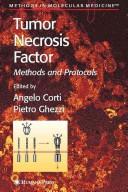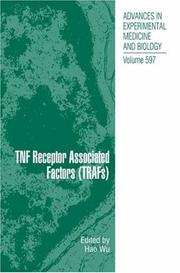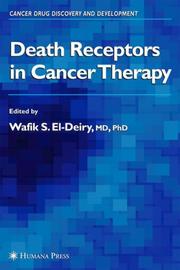| Listing 1 - 8 of 8 |
Sort by
|
Dissertation
Year: 2008 Publisher: [S.l.] : [chez l'auteur],
Abstract | Keywords | Export | Availability | Bookmark
 Loading...
Loading...Choose an application
- Reference Manager
- EndNote
- RefWorks (Direct export to RefWorks)
Receptors, Tumor necrosis factor --- Immunology --- Receptors, Tumor necrosis factor --- Immunology
Dissertation
ISBN: 9090099220 Year: 1996 Publisher: Maastricht Datawyse
Abstract | Keywords | Export | Availability | Bookmark
 Loading...
Loading...Choose an application
- Reference Manager
- EndNote
- RefWorks (Direct export to RefWorks)
Coal Mining --- Pneumoconiosis --- Receptors, Tumor Necrosis Factor --- Occupational Exposure --- Biomarkers --- etiology --- metabolism --- analysis --- blood

ISBN: 1280360305 9786610360307 1592597718 1588292231 Year: 2004 Publisher: Totowa, NJ : Humana Press : Imprint: Humana,
Abstract | Keywords | Export | Availability | Bookmark
 Loading...
Loading...Choose an application
- Reference Manager
- EndNote
- RefWorks (Direct export to RefWorks)
Because tumor necrosis factor-a (TNF-a) plays a pivotal role in the regulation of homeostasis and inflammatory immune responses, it offers valuable research opportunities to develop new drugs for the treatment of a wide range of disorders, including cancer, septic shock, rheumatoid arthritis, and other inflammatory diseases. In Tumor Necrosis Factor: Methods and Protocols, well-versed experimentalists survey the basic and translational research being conducted in this field and describe in detail the methods they have developed for TNF production, characterization, mutagenesis, and detection in biological specimens. They also provide several in vitro assays and animal models for studying the role of TNF in various TNF-related diseases and in cancer. The protocols presented follow the successful Methods in Molecular Medicine™ series format, each one offering step-by-step laboratory instructions, an introduction outlining the principle behind the technique, lists of equipment and reagents, and tips on troubleshooting and avoiding known pitfalls. Comprehensive and highly practical, Tumor Necrosis Factor: Methods and Protocols offers molecular and cellular biologists, pharmacologists, and toxicologists a diverse set of productive, cutting-edge tools for illuminating the pathophysiological roles of TNF in disease and for identifying new drugs.
Oncology . --- Oncology. --- Tumors --- Tumor necrosis factor --- Disease Models, Animal --- Receptors, Tumor Necrosis Factor --- Tumor Necrosis Factors --- TNF Receptor Ligands --- Tumor Necrosis Factor Superfamily Ligands --- Necrosis Factors, Tumor --- Receptor Ligands, TNF --- Receptors, Cachectin --- Receptors, TNF --- TNF Receptor --- Tumor Necrosis Factor Receptor --- Cachectin Receptors --- TNF Receptors --- Tumor Necrosis Factor Receptors --- Receptor, TNF --- Receptors, Death Domain --- Animal Disease Model --- Animal Disease Models --- Disease Model, Animal --- Animals, Laboratory --- Models, Biological --- Cachectin --- Lymphotoxin --- TNF (Immunology) --- Cytokines --- Glycoproteins --- Growth factors --- Macrophages

ISBN: 1281140651 9786611140656 0387706305 0387706291 1441924205 Year: 2007 Publisher: New York : Austin, Tex. : Springer Science+Business Media ; Landes Bioscience,
Abstract | Keywords | Export | Availability | Bookmark
 Loading...
Loading...Choose an application
- Reference Manager
- EndNote
- RefWorks (Direct export to RefWorks)
It has been established that TNF receptor associated factors (TRAFs) are critical signaling mediators for not only the TNF receptor superfamily, but also the interleukin-1 receptor/Toll-like receptor superfamily and the T-cell receptors. They play important roles in mammalian biology including embryonic development, innate and adaptive immune regulation and maintenance of cellular homeostasis. Agents that manipulate the signaling of these receptors are being used or showing promise towards the treatment and prevention of many human diseases such as rheumatoid arthritis, coronary heart disease, transplantation rejection, insulin resistance, multiple organ failure and cancer. TNF Receptor Associated Factors is the only literature that is entirely devoted to TRAFs. Almost every aspect of TRAF signaling is covered, including the different TRAF family members, their distinct biological functions, the TRAF structures, their modes of receptor recognition, the signaling mechanisms, and the roles of TRAFs in normal cellular functions and in viral infection. TNF Receptor Associated Factors is intended for a wide audience, including researchers in the field of TRAF signaling and students and postdoctoral fellows learning cell biology and cell signal transduction. This exciting new volume is up to date on the most recent advances in TRAF signal transduction.
Tumor necrosis factor --- Cellular signal transduction. --- Receptors. --- Cellular information transduction --- Information transduction, Cellular --- Signal transduction, Cellular --- Bioenergetics --- Cellular control mechanisms --- Information theory in biology --- Cachectin receptors --- Receptors, Tumor necrosis factor --- TNF receptors --- TNFRs (Tumor necrosis factor receptors) --- Tumor necrosis factor receptors --- Cell receptors --- Death receptors --- Cytology. --- Developmental biology. --- Computer security. --- Cell Biology. --- Developmental Biology. --- Systems and Data Security. --- Computer privacy --- Computer system security --- Computer systems --- Computers --- Cyber security --- Cybersecurity --- Electronic digital computers --- Protection of computer systems --- Security of computer systems --- Data protection --- Security systems --- Hacking --- Development (Biology) --- Biology --- Growth --- Ontogeny --- Cell biology --- Cellular biology --- Cells --- Cytologists --- Protection --- Security measures --- Cell biology.
Book
ISBN: 1441927999 0387895191 9786612361234 1282361236 0387895205 Year: 2009 Publisher: New York, N.Y. : Austin, Tex. : Springer Science+Business Media ; Landes Bioscience,
Abstract | Keywords | Export | Availability | Bookmark
 Loading...
Loading...Choose an application
- Reference Manager
- EndNote
- RefWorks (Direct export to RefWorks)
Tumor necrosis factor (TNF) superfamily is a rapidly growing family of cytokines that interacts with a corresponding superfamily of receptors. Ligand-receptor interactions of this superfamily are involved in numerous biological processes ranging from hematopoiesis to pleiotropic cellular responses, including activation, proliferation, differentiation, and apoptosis. The particular response depends on the receptor the cell type, and the concurrent signals received by the cell. Worldwide interest in the TNF field surged dramatically early in 1984 with the cloning and defining of the profound cellular effects of the first member of this family, TNFa. Subsequently, the major influence of TNFa on the development and functioning of the immune system was established. Today, over 20 human TNF ligands and their more than 30 corresponding receptors have been identified. Few receptors still remain orphans. What has emerged over the years is that most TNF ligands bind to one distinct receptor and some of the TNF ligands are able to bind to multiple TNF receptors, explaining to some extent the apparent disparity in the number of TNF receptors and ligands. Yet, in spite of some redundancy in TNF ligand/receptor interactions, it is clear that in vivo spatial, temporal, and indeed cell- and tissue-specific expression of both ligands and their receptors are important factors in determining the precise nature of cellular physiological and pathological processes they control. Therapeutic Targets of the TNF Superfamily presents the state-of-the art account on the role of TNF superfamily members in the pathogenesis and their use in current intervention of cancers and autoimmune disease. This text will be highly valuable for investigators to understand the disease processes regulated by TNF superfamily members and to develop effective therapeutics. A view into the future, inspired by the comprehensive work presented in this volume, predicts that researchers studying TNF superfamily members will continue to make rapid progress in identifying relevant components to the disease process and new therapeutic strategies to target many human diseases including cancers, autoimmune disease and others.
Tumor necrosis factor --Agonists --Therapeutic use. --- Tumor necrosis factor. --- Tumor necrosis factor --- Autoimmune Diseases --- Tumor Necrosis Factors --- Receptors, Tumor Necrosis Factor --- Neoplasms --- Inflammation --- Drug Therapy --- Immune System Diseases --- Diseases --- Intercellular Signaling Peptides and Proteins --- Pathologic Processes --- Cytokines --- Receptors, Cytokine --- Therapeutics --- Pathological Conditions, Signs and Symptoms --- Peptides --- Biological Factors --- Proteins --- Analytical, Diagnostic and Therapeutic Techniques and Equipment --- Receptors, Immunologic --- Amino Acids, Peptides, and Proteins --- Chemicals and Drugs --- Receptors, Cell Surface --- Membrane Proteins --- Microbiology & Immunology --- Biology --- Health & Biological Sciences --- Agonists --- Therapeutic use --- Therapeutic use. --- Cachectin --- Lymphotoxin --- TNF (Immunology) --- Medicine. --- Immunology. --- Biomedicine. --- Biomedicine general. --- Immunobiology --- Life sciences --- Serology --- Clinical sciences --- Medical profession --- Human biology --- Medical sciences --- Pathology --- Physicians --- Glycoproteins --- Growth factors --- Macrophages --- Biomedicine, general. --- Health Workforce
Book
ISBN: 3642030440 3642260764 9786612924118 3642030459 1282924117 Year: 2009 Publisher: Berlin : Springer,
Abstract | Keywords | Export | Availability | Bookmark
 Loading...
Loading...Choose an application
- Reference Manager
- EndNote
- RefWorks (Direct export to RefWorks)
Death receptors play a central role in directing apoptosis in mammalian cells. This process of active cell death is important for a number of biological processes, e.g. for the regulation of the immune system. Death receptors are cell surface receptors that transmit apoptotic signals initiated by corresponding death ligands. Many complex signaling pathways are activated and apoptosis is the final result of a complex biochemical cascade of events. Besides their role in the induction of cell death, evidence now exists that death receptors are able to activate several non-apoptotic signaling pathways which, depending on cellular context, may lead to apoptosis resistance, secretion of pro-inflammatory proteins, proliferation and invasive growth of cancer cells. This book looks at the molecular basis of death receptor signaling and the role of death receptors in cancer development.
Cancer -- Treatment. --- Carcinogenesis -- Molecular aspects. --- Death receptors -- Molecular aspects. --- Neoplasms -- Etiology. --- Neoplasms -- Therapy. --- Receptors, Death Domain -- Physiology. --- Receptors, Tumor Necrosis Factor -- Physiology. --- Tumor necrosis factor -- Physiological effect. --- Tumor necrosis factor -- Receptors -- Physiological effect. --- Cell receptors --- Carcinogenesis --- Cancer --- Tumor necrosis factor --- Diseases --- Receptors, Cytokine --- Receptors, Cell Surface --- Biological Science Disciplines --- Receptors, Death Domain --- Physiology --- Receptors, Tumor Necrosis Factor --- Neoplasms --- Membrane Proteins --- Receptors, Immunologic --- Natural Science Disciplines --- Disciplines and Occupations --- Proteins --- Amino Acids, Peptides, and Proteins --- Chemicals and Drugs --- Medicine --- Biology --- Cytology --- Oncology --- Microbiology & Immunology --- Health & Biological Sciences --- Physiological effect --- Molecular aspects --- Treatment --- Receptors --- Ligands (Biochemistry) --- Cancer. --- Cell death. --- Cell receptors. --- Apoptosis. --- Cellular signal transduction. --- Cellular information transduction --- Information transduction, Cellular --- Signal transduction, Cellular --- Cell membrane receptors --- Cell surface receptors --- Receptors, Cell --- Cell degeneration --- Cancers --- Carcinoma --- Malignancy (Cancer) --- Malignant tumors --- Medicine. --- Cancer research. --- Molecular biology. --- Oncology. --- Biochemistry. --- Cell biology. --- Biomedicine. --- Cancer Research. --- Cell Biology. --- Molecular Medicine. --- Biochemistry, general. --- Cell death --- Binding sites (Biochemistry) --- Cell membranes --- Cells --- Death (Biology) --- Tumors --- Bioenergetics --- Cellular control mechanisms --- Information theory in biology --- Biochemistry

ISBN: 9781588291721 1588291723 9781592598519 9786610358199 128035819X 159259851X Year: 2005 Publisher: Totowa, N.J. : Humana Press,
Abstract | Keywords | Export | Availability | Bookmark
 Loading...
Loading...Choose an application
- Reference Manager
- EndNote
- RefWorks (Direct export to RefWorks)
Cell death, or apoptosis, plays an important role in biological processes and disease and offers special opportunities to develop new therapies for cancer, autoimmune disease, stroke, heart attack, and Alzheimer's disease. In Death Receptors in Cancer Therapy, leading physician-scientists and basic researchers review in depth our latest understanding of the molecular events that regulate cell death, illuminating those molecules that provide targets for agonists or antagonists designed to modulate death signaling for therapeutic purposes. The authors focus on the extrinsic system of death receptors, their regulation and function, and their abnormalities in cancer. Topics of particlar interest include resistance to apoptosis, TRAIL signaling, death receptors in embryonic development, mechanisms of caspase activation, and death receptor mutations in cancer. Additional chapters address death signaling in melanoma, synthetic retinoids and death receptors, the role of p53 in death receptor regulation, immune suppression of cancer, and combination therapy with death ligands. Authoritative and up-to-date, Death Receptors in Cancer Therapy offers a timely compendium of cell death signaling pathways for those seeking either a basic understanding of apoptosis or the knowledge needed to develop new therapeutics that will activate or block death signaling in disease.
Neoplasms --- Cell Death --- Gene Therapy --- Receptors, Tumor Necrosis Factor --- Apoptosis --- Cell receptors --- Cancer --- Cellular signal transduction --- Apoptose --- Récepteurs cellulaires --- Transduction du signal cellulaire --- immunology --- therapy --- methods --- Molecular aspects --- Aspect moléculaire --- Kanker --- Kanker ; moleculaire aspecten --- Apoptosis. --- Cancer -- Molecular aspects. --- Cell receptors. --- Cellular signal transduction. --- Biological Therapy --- Genetic Engineering --- Diseases --- Investigative Techniques --- Cell Physiological Processes --- Receptors, Cytokine --- Cell Physiological Phenomena --- Receptors, Immunologic --- Analytical, Diagnostic and Therapeutic Techniques and Equipment --- Genetic Techniques --- Therapeutics --- Receptors, Cell Surface --- Phenomena and Processes --- Membrane Proteins --- Proteins --- Amino Acids, Peptides, and Proteins --- Chemicals and Drugs --- Methods --- Medicine --- Biology --- Health & Biological Sciences --- Cytology --- Oncology --- Molecular aspects. --- Cellular information transduction --- Information transduction, Cellular --- Signal transduction, Cellular --- Cell membrane receptors --- Cell surface receptors --- Receptors, Cell --- Medicine. --- Oncology. --- Medicine & Public Health. --- Tumors --- Clinical sciences --- Medical profession --- Human biology --- Life sciences --- Medical sciences --- Pathology --- Physicians --- Bioenergetics --- Cellular control mechanisms --- Information theory in biology --- Binding sites (Biochemistry) --- Cell membranes --- Cell death
Book
ISBN: 0128004614 0127999647 9780128004616 9780127999647 Year: 2014 Publisher: London
Abstract | Keywords | Export | Availability | Bookmark
 Loading...
Loading...Choose an application
- Reference Manager
- EndNote
- RefWorks (Direct export to RefWorks)
The Value of BCG and TNF in Autoimmunity provides an overview of current research and thinking related to tumor necrosis factor (TNF) induction and the use of the bacillus Calmette-Guérin (BCG) vaccine as potential treatment approaches to diverse forms of autoimmunity. BCG, commonly known as an anti-tuberculosis vaccine, is being explored in worldwide clinical trials as an approach to the treatment of certain forms of autoimmunity. The scope of research behind this therapeutic approach spans from the basic science of TNF signaling to research in diverse autoimmune disciplines, such
Autoimmunity. --- Cellular signal transduction. --- Tumor necrosis factor. --- Autoimmune diseases --- BCG vaccines --- Tumor necrosis factor --- Immune System Diseases --- Intercellular Signaling Peptides and Proteins --- Cytokines --- Immunity --- Tuberculosis Vaccines --- Immunomodulation --- Bacterial Vaccines --- Proteins --- Biological Therapy --- Peptides --- Biological Factors --- Immune System Phenomena --- Diseases --- Phenomena and Processes --- Amino Acids, Peptides, and Proteins --- Vaccines --- Therapeutics --- Chemicals and Drugs --- Analytical, Diagnostic and Therapeutic Techniques and Equipment --- Biological Products --- Complex Mixtures --- Tumor Necrosis Factors --- Immunotherapy --- Autoimmune Diseases --- Autoimmunity --- BCG Vaccine --- Medicine --- Biology --- Health & Biological Sciences --- Clinical Immunology --- Microbiology & Immunology --- Therapeutic use --- Receptors. --- Etiology. --- Cellular information transduction --- Information transduction, Cellular --- Signal transduction, Cellular --- Bioenergetics --- Cellular control mechanisms --- Information theory in biology --- Autoimmunologic diseases --- Immunologic diseases --- Cachectin receptors --- Receptors, Tumor necrosis factor --- TNF receptors --- TNFRs (Tumor necrosis factor receptors) --- Tumor necrosis factor receptors --- Cell receptors --- Death receptors --- Autoallergy --- Autoantibodies
| Listing 1 - 8 of 8 |
Sort by
|

 Search
Search Feedback
Feedback About UniCat
About UniCat  Help
Help News
News